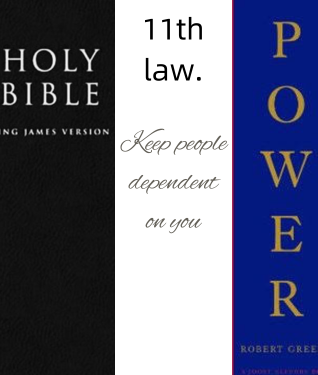In the grand tapestry of human history, few narratives hold as much intrigue and wisdom as those found within the Bible. Within its pages lie the stories of men and women, their choices, and the consequences they faced. The subtleties of power dynamics, akin to Robert Greene’s 11th law in “The 48 Laws of Power” – “Learn to keep people dependent on you,” are echoed through these ancient tales. In this exploration, we unravel the stories of biblical characters who chose a different path, defying the principle of strategic dependency, and the far-reaching consequences of their decisions.
Adam and Eve: An Ill-Fated Departure from Wisdom.
The Book of Genesis opens with the story of Adam and Eve, whose disobedience in the Garden of Eden led to humanity’s fall from grace. The essence of Greene’s 11th law is about ensuring dependency, but Adam and Eve, seeking knowledge, chose to defy God’s command not to eat from the tree of knowledge. This act of defiance was a pivotal moment, where the desire for independence triumphed over a state of reliance.
The consequence of this disobedience was profound – expulsion from paradise, the introduction of toil and hardship, and the eventual introduction of death into the human experience. Adam and Eve’s choice altered the course of humanity, teaching the eternal lesson that challenging established boundaries can have far-reaching repercussions.
Moses and the People of Israel: A Lesson in Impatience.
The story of Moses and the Israelites in the desert epitomizes the struggle between obedience and impatience. After being led out of Egypt, the Israelites were entirely dependent on Moses for guidance and sustenance. However, during their journey, they grew impatient and anxious about Moses’ prolonged absence on Mount Sinai.
In a moment of impetuousness, they crafted a golden calf, deviating from the path of strategic dependency on Moses and seeking solace in an idol. This act of rebellion shattered the notion of relying on a chosen leader, leading to dire consequences. God’s wrath descended upon them, resulting in punishment and delay of their entry into the Promised Land.
Saul: The Price of Ignoring Wisdom.
Saul, the first king of Israel, provides another cautionary tale of deviating from strategic dependency. Initially, Saul displayed promise, guided by the prophet Samuel’s wisdom. However, he let pride and impatience steer him away from this guidance.
In a critical moment, during a battle against the Philistines, Saul took matters into his own hands by offering a sacrifice, a role reserved for the prophet Samuel. This disobedience marked a turning point. Samuel delivered a grave prophecy – Saul’s dynasty would not endure, and the kingship would pass to another. The consequences of his disobedience haunted his reign and the fate of his lineage.
Conclusion: A Dance of Choices and Consequences…
The Bible unfolds a grand narrative of humanity’s journey through the ages, encompassing moments of triumph and tribulation. In the context of power dynamics, the 11th law of power underscores the essence of keeping people dependent. However, the tales of Adam and Eve, Moses and the Israelites, and Saul remind us that the human experience is not bound by strict laws but by choices and consequences.
The Bible serves as a timeless mirror, reflecting our struggles, triumphs, and the eternal dance between obedience and disobedience. The characters within its pages illuminate the complexities of power dynamics, urging us to tread carefully and consider the repercussions of our actions.
In our own lives, we are presented with choices daily. The wisdom lies in understanding when to adhere to established principles of influence and when to carve a unique path. The tales of Adam and Eve, Moses, and Saul call us to reflect on the delicate balance between strategic dependency and the drive for independence, guiding us towards a more profound understanding of the art of power.







































Discussion about this post